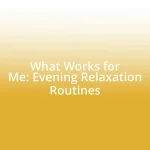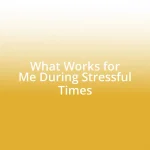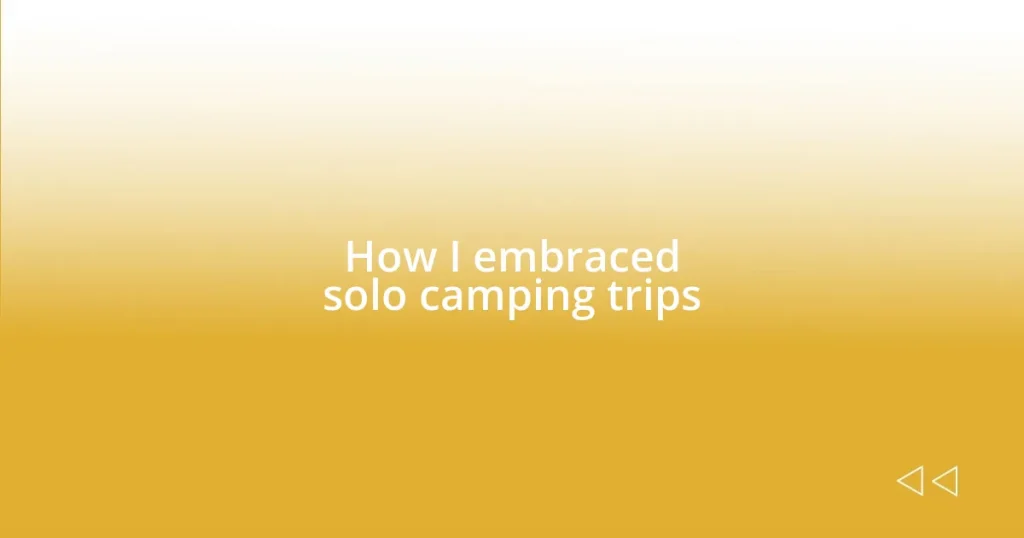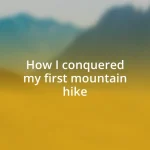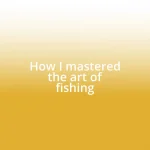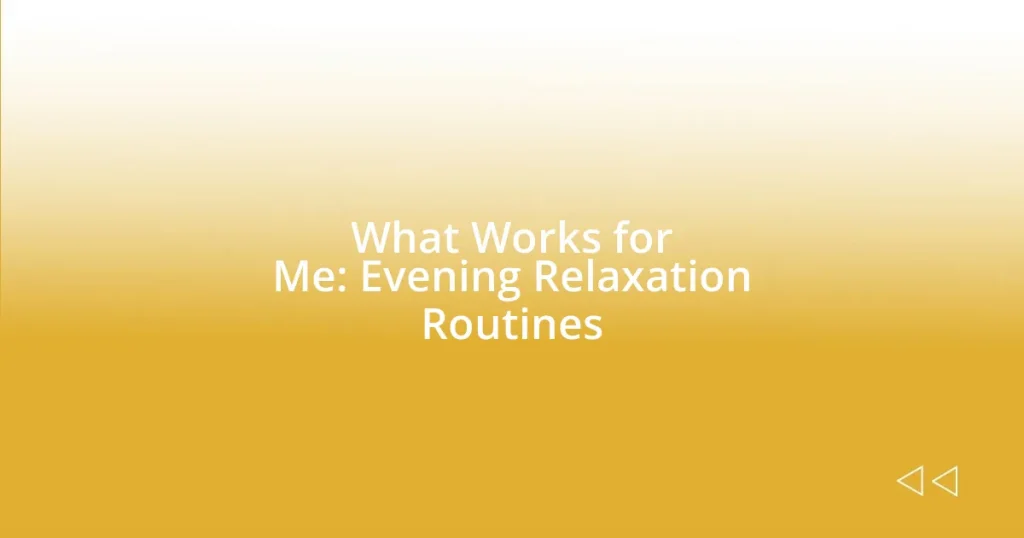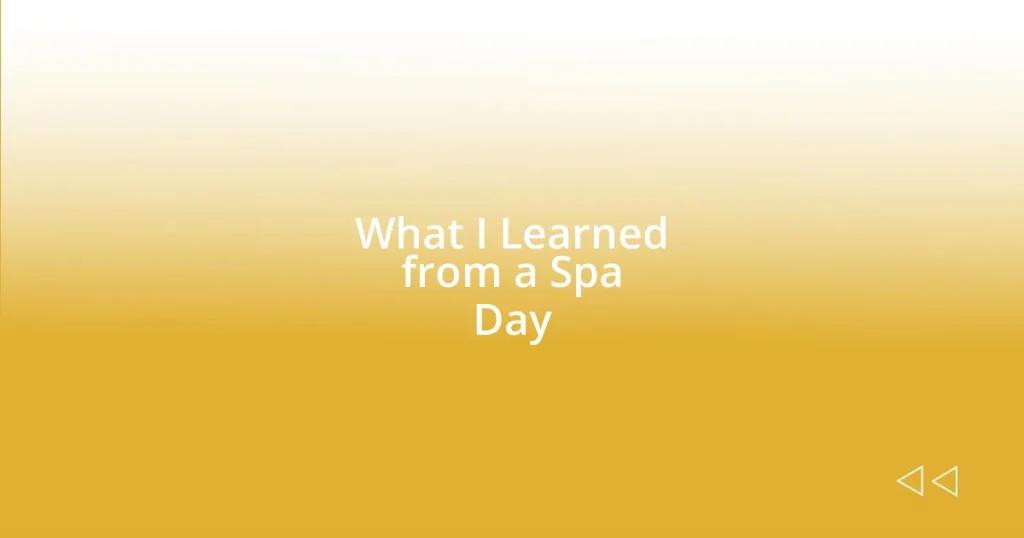Key takeaways:
- Solo camping is an opportunity for solitude and self-reflection, allowing for personal clarity and discovery.
- Planning and choosing the right campsite enhances the camping experience, ensuring safety and comfort.
- Essential gear is crucial; lightweight, practical items can improve mobility and enjoyment while camping alone.
- Embracing the unexpected moments in nature fosters resilience and enriches the overall camping adventure.
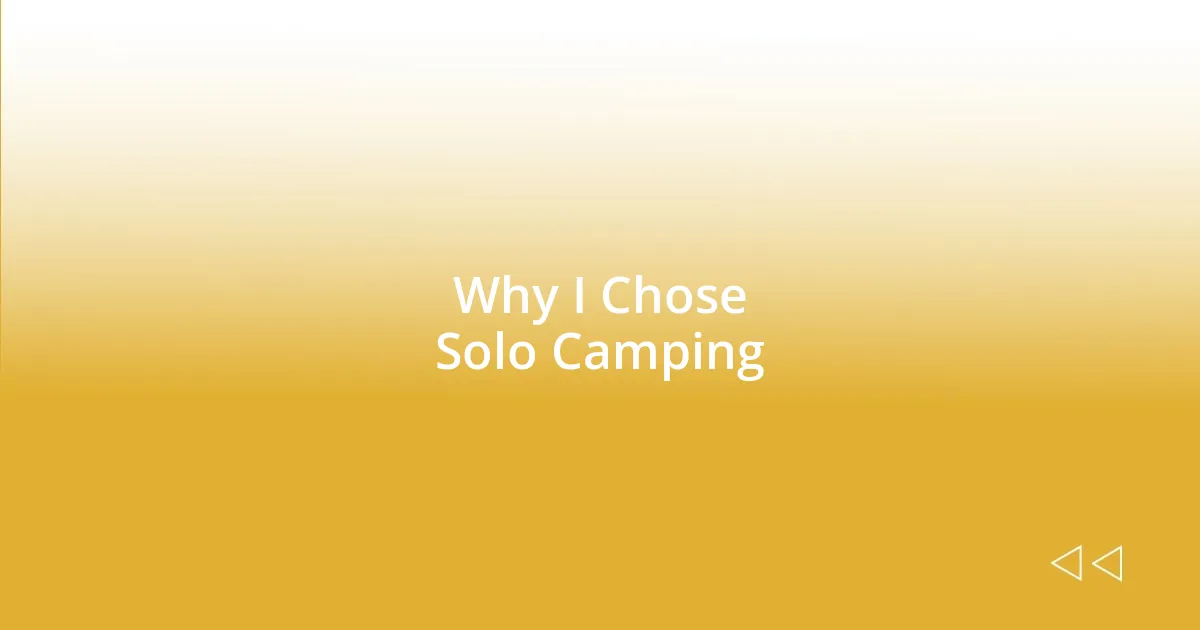
Why I Chose Solo Camping
When I first considered solo camping, I realized it was about reclaiming my solitude in nature. After a hectic week filled with meetings and deadlines, escaping into the wilderness felt like heaven. Have you ever felt that urge to just disconnect and breathe? That’s exactly what drew me in.
Another reason I embraced solo camping was the thrill of self-discovery. I vividly remember my first night alone in a tent, the stars twinkling like a million tiny beacons above me. As I sat quietly, I started reflecting on my life choices, goals, and dreams. It was liberating to face the stillness, and I found clarity I hadn’t experienced in ages.
Additionally, I craved the freedom that came with deciding where to go and what to do entirely on my own terms. No need to compromise on hiking routes or meal choices meant I could embrace spontaneity. One particular trip, I stumbled upon this hidden waterfall simply because I chose a different path. Isn’t it remarkable how stepping outside your comfort zone can lead to extraordinary discoveries?
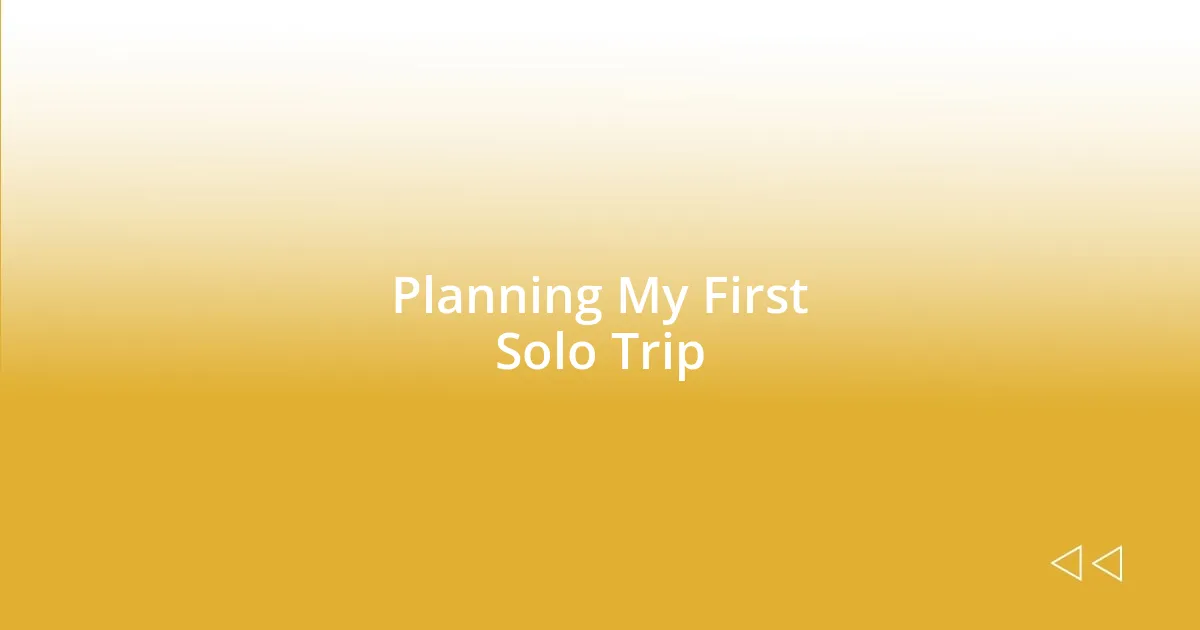
Planning My First Solo Trip
Planning my first solo camping trip was both exciting and daunting. I remember spreading out my gear in my living room, gleefully hopeful yet anxious about whether I’d remembered everything. The thrill of mapping out my route fueled my excitement, but I kept asking myself—what essentials do I really need? My practical side nudged me to make checklists, which helped ease my nerves as I visualized each day’s adventure.
Next, I took the time to choose a campground that resonated with my heart. A hidden gem by a tranquil lake caught my eye; it felt inviting. I think choosing the right spot can genuinely impact your experience. I even chatted with a few fellow campers online, learning about the area’s quirky trails. Their advice shaped my itinerary, and suddenly, it felt less like a solo venture and more like a shared adventure with friendly strangers.
Lastly, as the departure date approached, I found myself getting more emotionally invested in the experience. I thought of the freedom awaiting me—no distractions, just simple moments to relish the environment. Each time I felt the wave of doubt creep in, I reminded myself of the beautiful sunset I might witness, painting the sky with colors I had yet to see. That vision propelled me forward, turning my initial trepidation into eager anticipation.
| Planning Aspect | My Approach |
|---|---|
| Gear Checklist | Created a detailed list to alleviate anxiety. |
| Choosing Location | Selected a campground with positive reviews; engaged with the community for tips. |
| Emotional Preparation | Focused on the excitement of freedom and personal discovery. |
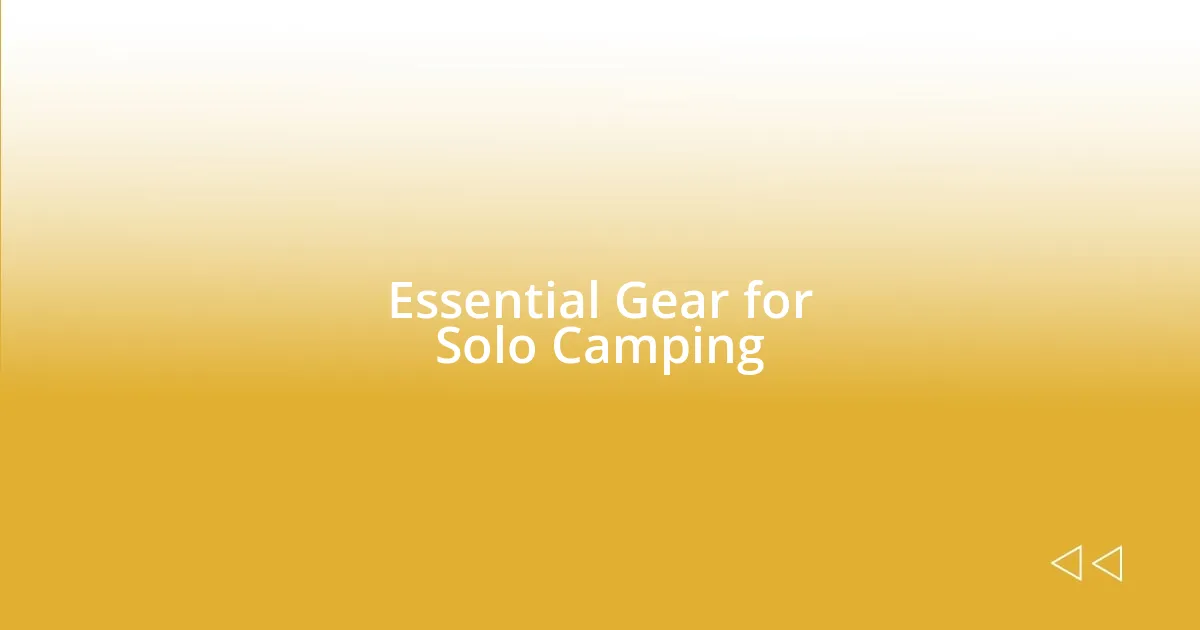
Essential Gear for Solo Camping
Choosing the right gear for solo camping can make or break your experience. I remember the first time I packed for a trip. My excitement transformed into a minor panic as I tried to fit everything into my backpack. Through trial and error, I discovered that less is often more. Essential gear should be lightweight yet durable, allowing you to focus on the adventure without being bogged down.
Here’s a list of must-haves for any solo camper:
- Tent: Opt for a lightweight, easy-to-pitch tent. Mine packs down to the size of a water bottle!
- Sleeping Bag: A compact, insulated sleeping bag keeps you warm and cozy at night.
- Portable Stove: A small camp stove lets you enjoy hot meals while minimizing weight.
- Water Filtration System: Staying hydrated is crucial. I always carry a portable filter for peace of mind.
- First Aid Kit: Accidents can happen; being prepared is essential, especially when you’re alone.
- Multi-tool: This versatile tool comes in handy for everything from food prep to gear repairs.
- Headlamp: A reliable headlamp is critical for navigating at night and keeps your hands free.
As I packed my gear for my second solo trip, I realized that every item I chose reflected my growing confidence and understanding of what I truly needed in the wild. Each trip helped me refine my selection, proving that the essence of solo camping lies in being resourceful and prepared.
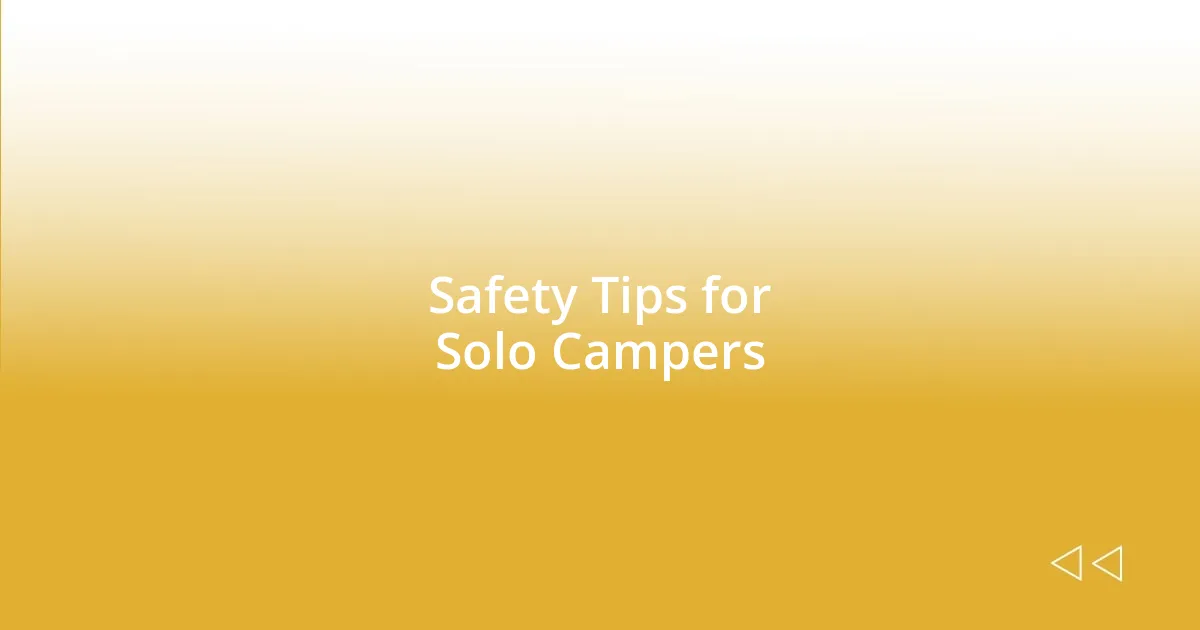
Safety Tips for Solo Campers
When it comes to solo camping, safety should always be your top priority. I’ve learned the hard way to stick to well-trafficked trails and campsites. While it can be tempting to venture off the beaten path, staying in areas where others frequent helps you stay connected and provides a sense of security. Has there ever been a moment in nature where you felt a little uncertain? For me, knowing other campers were nearby always eased those anxious moments spent alone in a vast forest.
Communication is key, especially when you’re completely on your own. Before heading out, I always let someone know my plans, including my destination and expected return time. Creating a safety plan gives you peace of mind and helps your loved ones stay informed. I remember a trip when I lost my phone signal; knowing someone was aware of my whereabouts made those moments of isolation feel much less daunting.
Lastly, always trust your instincts. If something feels off, don’t hesitate to pack up and move. I once arrived at a campsite that felt uneasy due to strange noises in the night. Instead of forcing myself to stay, I chose to set up my tent elsewhere, and that small decision saved me a lot of unnecessary stress. What about you? Have you ever listened to your gut in a similar situation? I believe that honing this instinct can truly enhance your solo camping experience, ensuring that your adventures are both fulfilling and safe.
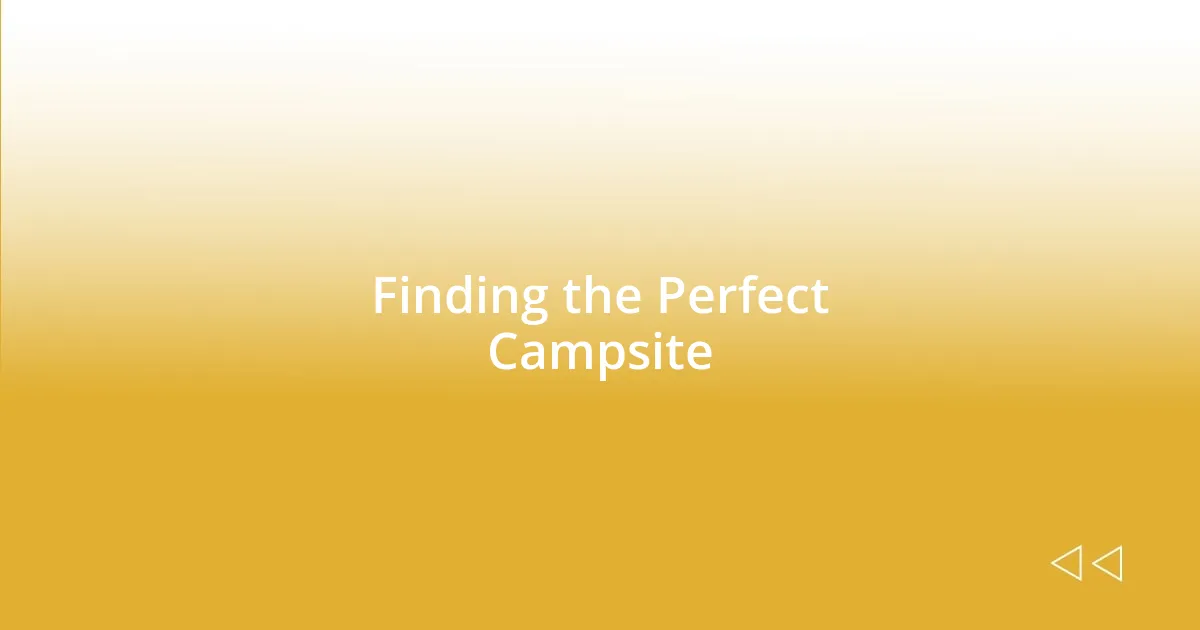
Finding the Perfect Campsite
Finding the perfect campsite often feels like a treasure hunt. I vividly recall my first solo camping experience, where I spent an hour searching for a spot that felt just right. The thrill of discovery coursed through me as I stumbled upon a secluded area nestled by a babbling brook, the sound soothing away my earlier worries. It taught me that taking the time to scout can lead to unforgettable moments in nature.
Location is not just about aesthetics; it’s also about safety. I’ve learned the hard way to avoid camping too close to water sources, as they can flood unexpectedly. Can you imagine waking up in the middle of the night with water lapping at your tent? I can! Choosing a spot that’s elevated and away from potential hazards like falling branches can truly make the difference between a peaceful night and a chaotic one.
Another tip I’ve embraced is making sure my campsite gets adequate sunlight, especially in cooler months. I once camped in a shady area and woke up feeling like a popsicle! Reflecting on that experience, I now appreciate the warmth of the sun first thing in the morning. Don’t you think starting the day with a smile—and a warm cup of coffee—is far better than the cold shock of a brisk morning? Selecting the right campsite can significantly impact not just your stay, but also your entire camping adventure.
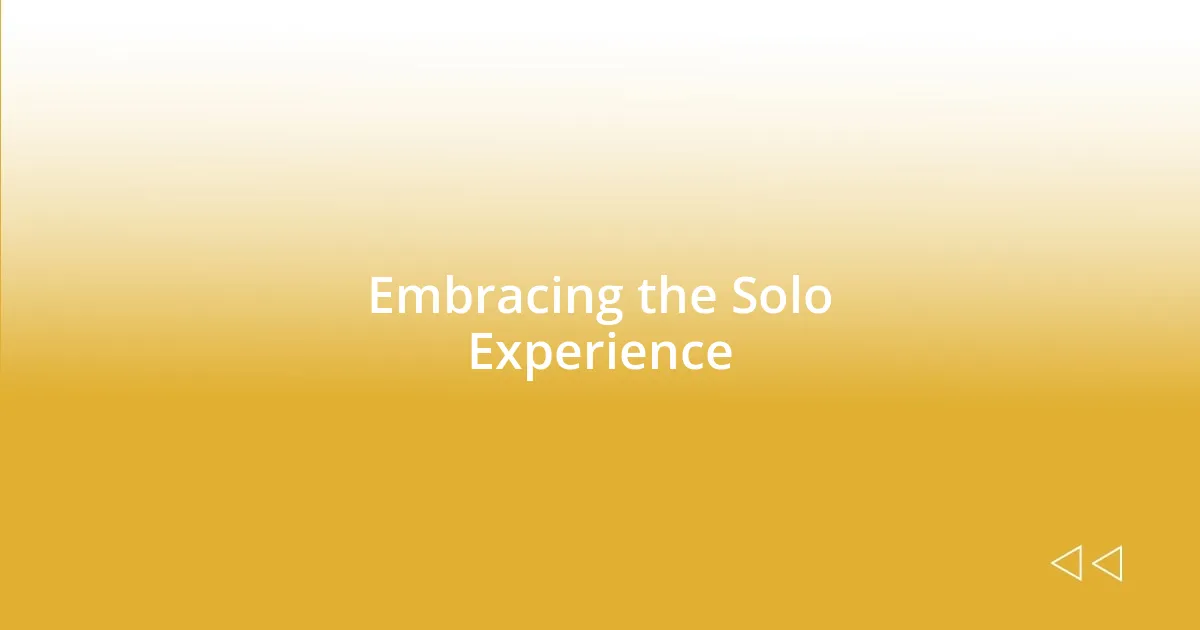
Embracing the Solo Experience
Embracing the solo camping experience means fully engaging with not just the environment around you but also your inner thoughts. I remember my first night alone beneath a vast starry sky; it felt simultaneously exhilarating and intimidating. Have you ever experienced that quiet moment when the wilderness pulls you in, yet a voice inside whispers doubts? It’s a blend of solitude and serenity, where every rustle in the leaves can feel magnified. I found that acknowledging that discomfort allowed me to transition into a state of calmness, reminding myself that every sound is simply part of the symphony of nature.
The beauty of solo camping is the opportunity to connect deeply with your surroundings and yourself. I particularly cherish those moments when I’d sit by the campfire, watching the flames dance as I reflected on my journey and aspirations. Isn’t it fascinating how nature often mirrors our struggles and triumphs? Just as the fire flickers and flares, so do our thoughts and emotions, and embracing them can lead to profound insights about what truly ignites our passions.
I’ve discovered that solo camping is also about embracing the unexpected. On one trip, I faced an unexpected storm, forcing me to seek shelter in my tent, which became a cozy refuge. As the rain poured, I initially felt a wave of frustration, but soon I found comfort in the gentle rhythm of droplets against the fabric. Don’t you think that sometimes, the best memories arise from those unplanned moments? Those experiences taught me resilience and adaptability—two qualities that aren’t just useful in camping but in life as well. Embracing the unexpected allows you to build a richer, more fulfilling journey every time you venture into the wild on your own.
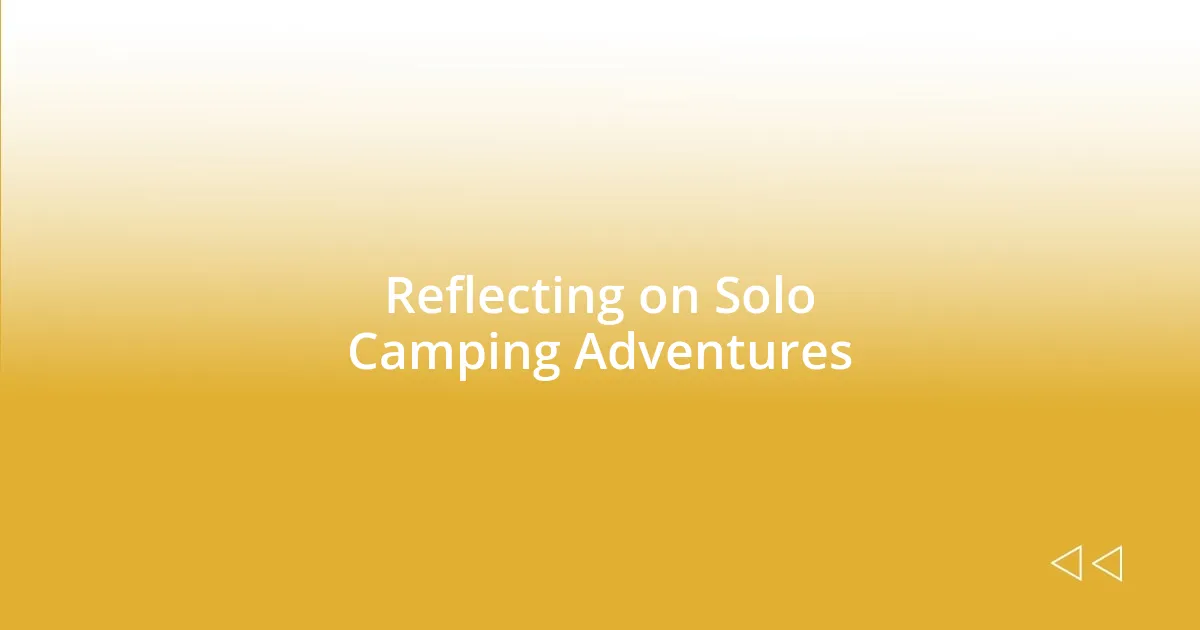
Reflecting on Solo Camping Adventures
Reflecting on my solo camping adventures brings forth a mix of nostalgia and growth. I recall a trip where I took a long hike alone, pushing my physical limits. Reaching the summit, the view was incredibly rewarding, yet it was the quiet moment at the top, where I allowed myself to just breathe and soak it all in, that truly grounded me. Have you ever had a moment when everything else fades away, leaving only the beauty of nature and your thoughts?
One of the most profound realizations came after a long day of exploring. As I settled into my tent, I felt an overwhelming sense of gratitude wash over me. The solitude, I discovered, wasn’t just about being alone; it was about the clarity it provided. The chirping crickets and rustling leaves filled the silence, offering a comforting backdrop to contemplate my dreams. Have you ever noticed how nature can amplify your thoughts, turning them into a creative soundtrack for reflection?
There was another time, during an early autumn trip, when I felt an unexpected wave of sadness wash over me as the leaves fell. Instead of resisting it, I embraced that emotion, letting it mingle with the crisp, fresh air. This moment of vulnerability turned into a beautiful lesson on the cycles of life and nature. I began to see that camping alone is as much about the internal journey as it is about the external adventure. Isn’t it intriguing how our experiences in nature can mirror the ebb and flow of our emotions?
